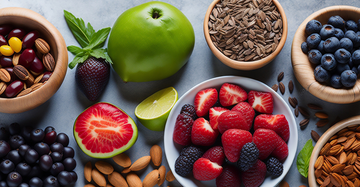Antioxidants are essential substances for the good health of our body. They are found in many foods and have the ability to protect our cells from damage caused by free radicals.
In this blog topic, we are going to explore in detail what antioxidants are for, how they work and what foods are rich in them. We will also see how we can incorporate antioxidants into our diet to improve our health and reduce the risk of developing diseases, among other important aspects related to the topic.
What are antioxidants?
Antioxidants are compounds that protect us from free radicals, unstable molecules that can damage our cells and contribute to aging and the development of chronic diseases such as cancer, heart and neurodegenerative diseases.
How many types of antioxidants are there?
Antioxidants fall into two main categories: water-soluble and fat-soluble.
Water-soluble antioxidants
Water-soluble antioxidants are found in fruits and vegetables. They dissolve in water and are excreted from the body through urine. Some examples of water-soluble antioxidants include:
- Vitamin C: is an important antioxidant that helps protect cells against damage caused by free radicals. It is found in citrus fruits, strawberries, broccoli and peppers.
- Flavonoids: are a group of antioxidants found in fruits, vegetables and whole grains. Some common flavonoids include catechins, anthocyanins, and polyphenols.
- Carotenoids: are a group of plant pigments found in brightly colored fruits and vegetables. Some common carotenoids include beta-carotene, lycopene, and lutein.
Fat-soluble antioxidants
Fat-soluble antioxidants are found in nuts, seeds and vegetable oils. They dissolve in fat and are stored in adipose tissues.
Some examples of fat-soluble antioxidants include:
- Vitamin E: is an important antioxidant that helps protect cells against damage caused by free radicals. It is found in nuts, seeds and vegetable oils.
- Selecio: is a mineral that helps protect cells against damage caused by free radicals. It is found in shellfish, nuts and seeds.
- Carotenoids: Some carotenoids, such as lycopene and lutein, are fat-soluble.
Other antioxidants
In addition to the antioxidants mentioned above, there are other compounds that have antioxidant properties. Some examples include:
- Coenzyme Q10: is a molecule found in cells and helps produce energy. It also has antioxidant properties.
- Resveratrol: is a compound found in grapes and red wine. It has antioxidant and anti-inflammatory properties.
- Alpha Lipoic Acid: This is an antioxidant found in foods and can also be taken as a supplement.
How to get antioxidants from food?
Antioxidants are found in foods and can also be obtained through supplements.
Some of the foods rich in antioxidants are:
- Fruit:
- Strawberries: vitamin C, flavonoids
- Blueberries: flavonoids, anthocyanins
- Oranges: vitamin C, beta carotene
- Tomatoes: lycopene
- Blackberries: anthocyanins
- Vegetables:
- Broccoli: vitamin C, sulforaphane
- Cauliflower: vitamin C, sulforaphane
- Spinach: lutein, zeaxanthin
- Carrots: beta carotene
- Pumpkin: beta carotene
- Whole grains:
- Brown rice: vitamin E
- Oats: vitamin E
- Quinoa: vitamin E
- Legumes:
- Lentils: vitamin C
- Chickpeas: vitamin C
- Beans: vitamin C
- Nuts and seeds:
- Almonds: vitamin E
- Walnuts: vitamin E
- Hazelnuts: vitamin E
- Sunflower seeds: vitamin E
- Pumpkin seeds: vitamin E
Health benefits of antioxidants
Some of the health benefits of antioxidants include:
-
Protection against heart disease:
Antioxidants, such as vitamins C and E, can protect the heart by reducing oxidative stress and decreasing the oxidation of LDL cholesterol ("bad" cholesterol), which may reduce the risk of heart disease.
-
Reduced risk of cancer:
Antioxidants can help prevent cell damage that can lead to the development of cancer. Some studies suggest that antioxidants may reduce the risk of certain types of cancer, such as lung, prostate, and colon cancer.
-
Improve eye health:
Antioxidants, especially vitamin C, vitamin E and carotenoids, can help protect the eyes from oxidative damage and reduce the risk of age-related eye diseases such as cataracts and macular degeneration.
-
Strengthen the immune system:
Antioxidants help strengthen the immune system by protecting cells from oxidative damage. This can help prevent disease and promote greater resistance to infection.
-
Delay cell aging:
Free radicals contribute to cellular aging and the appearance of wrinkles and expression lines. Antioxidants help fight oxidative damage, which can slow the aging process and keep skin healthy and radiant.
-
Protect against neurodegenerative diseases:
Antioxidants can help protect neurons from damage, which can help prevent diseases such as Alzheimer's and Parkinson's. Some specific antioxidants that have been linked to a lower risk of neurodegenerative diseases include vitamin E, lycopene, coenzyme Q10, and alpha lipoic acid.
Tips to increase consumption of foods rich in antioxidants
- Eat a balanced diet: Be sure to include a variety of fresh fruits and vegetables in your daily meal plan. The more colorful your plate is, the better.
- Choose foods rich in vitamin E : Foods such as nuts, seeds, and olive oil are excellent sources of vitamin E, which is a powerful antioxidant.
- Introduce foods rich in vitamin C : Citrus fruits such as oranges, tangerines and lemons are high in vitamin C. You can also incorporate peppers, guavas and kiwis in your daily diet.
- Incorporate dark green leafy vegetables : Green leafy vegetables such as spinach, kale, and chard are rich in antioxidants such as vitamin C, vitamin E, and beta-carotene.
- Don't forget whole grains : Whole grains like brown rice, quinoa, and oats contain antioxidants like vitamin E and selenium. Replace refined grains with whole grain versions whenever possible.
- Increase your green tea consumption: Green tea contains polyphenols and catechins, which are powerful antioxidants. Try drinking a cup of green tea every day.
- Consider taking supplements: Consult a health professional before taking any antioxidant supplements. Sometimes using supplements can be beneficial, especially if you have any nutritional deficiencies.
Remember to consume foods raw or steamed, avoiding prolonged cooking or frying that could degrade their properties.
Dietary recommendations
The recommended daily intake of antioxidants varies depending on age and sex. In general, it is recommended that adults consume at least 5 servings of fruits and vegetables per day.
The nutritional value of antioxidants varies depending on the type of antioxidant. Some antioxidants, such as vitamin C, are essential for the body and must be consumed daily. Other antioxidants, such as carotenoids, are beneficial to health, but are not essential.
What happens in the body if we do not consume foods rich in antioxidants?
Antioxidants are substances that help protect cells from damage caused by free radicals. Free radicals are unstable molecules that can cause damage to cells, which can lead to diseases such as cancer, heart disease, and premature aging.
Failure to consume enough antioxidants exposes the body to damage caused by free radicals. This can lead to a number of health problems, including:
- Increased risk of cancer: Free radicals can damage DNA, which can lead to the development of cancer cells.
- Increased risk of heart disease: Free radicals can damage artery walls, which can lead to atherosclerosis and heart disease.
- Premature aging: Free radicals can accelerate the aging process.
Lack of antioxidants in the body can cause other health problems, such as:
- Inflammation: Free radicals can contribute to inflammation, which is a risk factor for many diseases.
- Weak immune system: Free radicals can weaken the immune system, which can make the body more susceptible to infections.
- Skin problems: Free radicals can damage the skin, which can lead to wrinkles, spots, and other signs of aging.
Therefore, it is important to consume a diet rich in antioxidants to help protect the body from damage caused by free radicals.
As you could see, antioxidants are an important tool to prevent diseases and improve our health in general. By including antioxidant-rich foods in our daily diet, we can reduce the risk of chronic diseases such as heart disease, diabetes, and cancer.
Antioxidants have anti-inflammatory and anti-aging properties, making them an important factor in preventing premature aging. It is important to remember that antioxidants are not a miracle cure for disease, but they can be an important part of a healthy lifestyle. By choosing foods rich in antioxidants and eating a balanced diet, you can improve your long-term health and well-being.





